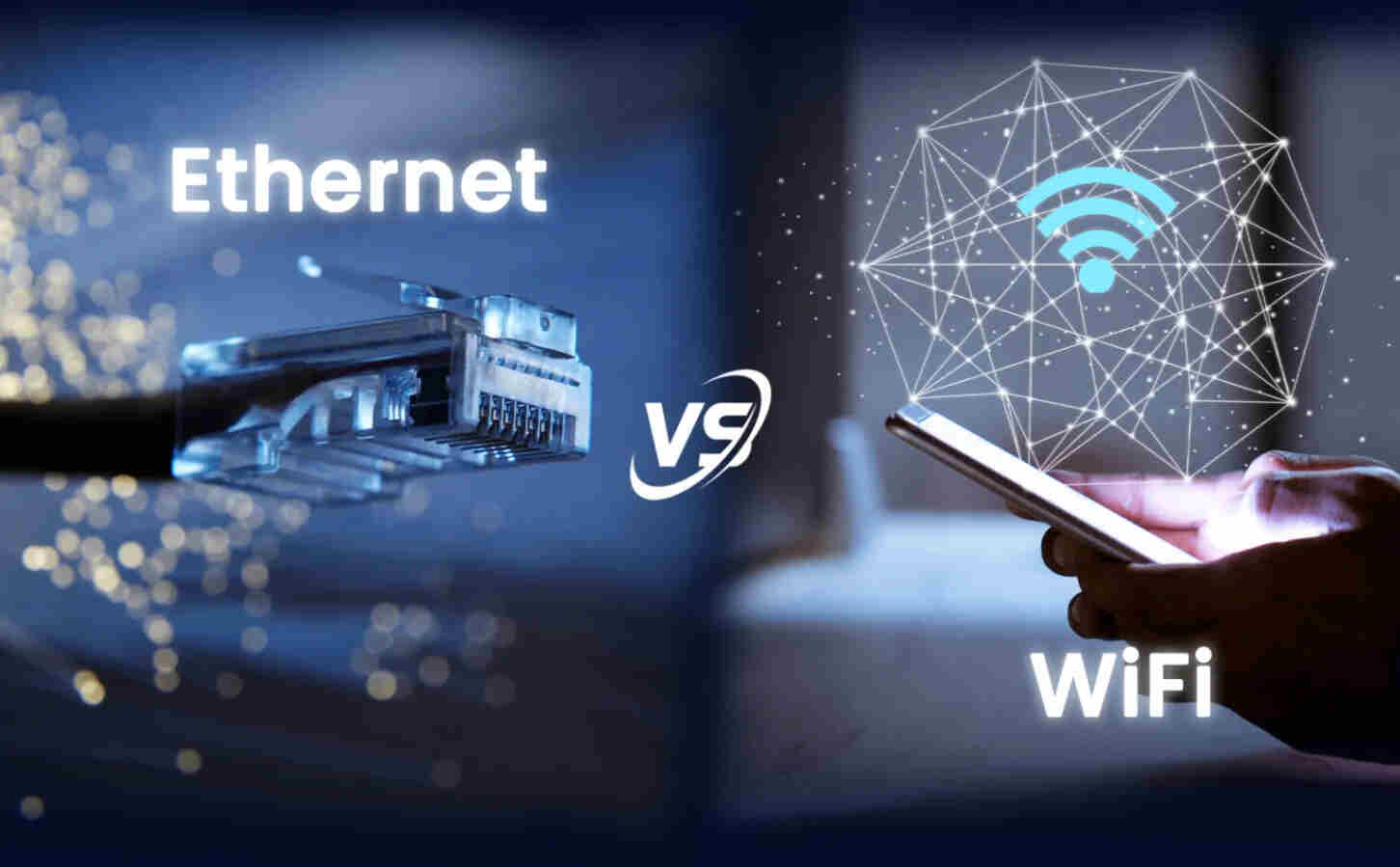


Ethernet vs WiFi: Which should you use? Compare speed, security, and reliability to choose the best connection for gaming, streaming, or work.
Ethernet vs WiFi – Which Connection Fits Your Needs?
Internet access is no longer a luxury—it’s a necessity. From streaming movies to working remotely and gaming online, we rely on a strong internet connection every day. But when it comes to how you connect, the two main options are Ethernet (wired) and WiFi (wireless).
Ethernet delivers stable, fast, and secure internet, while WiFi offers convenience, flexibility, and wireless access for multiple devices. The right choice depends on whether you prioritize performance or mobility.
At first glance, both do the same job: they connect you to the internet. But the way they work, and the experience they provide, is very different. Ethernet is all about reliability and speed, while WiFi focuses on mobility and ease of use. Let’s break down the differences so you can choose the right one for your home, office, or even RV internet setup.
Ethernet is a wired connection where your device connects to the router or modem with a cable. Because it doesn’t rely on wireless signals, Ethernet provides a direct and stable connection.
Advantages of Ethernet include:
Consistent high speeds
Very low latency (perfect for gaming and video calls)
Stronger security since it’s harder to hack
Dependable connection not affected by walls or interference
This makes Ethernet the go-to for users who can’t compromise on performance.
WiFi is a wireless connection that uses radio signals from your router to link devices like laptops, smartphones, and smart TVs. It eliminates the need for cables, making it more convenient and flexible.
Advantages of WiFi include:
Wireless freedom—move around while staying connected
Easy setup with no wires
Ability to connect many devices at the same time
Works well for casual browsing, streaming, and smart gadgets
WiFi is the standard in homes, offices, and RVs because it’s simple and convenient.
Speed and Stability: Ethernet offers consistently faster speeds than WiFi.
Low Latency: Gamers and remote workers benefit from reduced lag.
Security: Wired connections are harder for outsiders to intercept.
Reliability: No signal drops due to walls, distance, or interference.
Convenience: No messy wires, just connect and go.
Mobility: Stay connected anywhere within range of the router.
Multi-Device Use: Great for families and shared spaces.
Flexibility: Ideal for smart homes and RVs with multiple gadgets.
For Gaming: Ethernet wins—low latency makes gameplay smoother.
For Streaming: Ethernet is more reliable for HD or 4K streaming, though WiFi works fine for everyday use.
For Remote Work: Ethernet is best for video conferencing and large file uploads.
For Smart Devices: WiFi is essential, as most modern devices don’t have Ethernet ports.
For RV Internet: WiFi gives flexibility while traveling, while Ethernet can be useful when parked and needing a stable connection.
RV living comes with unique internet challenges. WiFi is usually the go-to choice because it allows multiple devices to connect wirelessly—perfect for streaming, browsing, and staying connected on the move.
But when stability matters, Ethernet becomes important. Plugging into an RV router with a cable ensures you won’t deal with random drops or lag. With Ubifi RV internet, you get the convenience of WiFi and the stability of Ethernet, giving you both options based on your needs.
The Ethernet vs WiFi debate doesn’t have a single winner—it depends on what you need.
Go with Ethernet if you want speed, security, and reliability.
Stick with WiFi if you value mobility, convenience, and connecting multiple devices.
In reality, many people use both. Ethernet powers their most important devices, while WiFi keeps everything else connected. That balance ensures the best possible internet experience—whether at home, at work, or in your RV.
1. Is Ethernet faster than WiFi?
Yes. Ethernet provides faster and more stable speeds compared to WiFi.
2. Which is better for gaming, Ethernet or WiFi?
Ethernet is better because it reduces lag and ensures smoother gameplay.
3. Can WiFi fully replace Ethernet?
Not always. WiFi is convenient but less reliable than Ethernet for critical tasks.
4. Do I need Ethernet for remote work?
It’s not mandatory, but Ethernet is recommended for video calls and file transfers.
5. Is WiFi less secure than Ethernet?
Yes. WiFi can be hacked if not secured properly, while Ethernet is harder to intercept.
6. Can I use Ethernet and WiFi together?
Yes, many setups combine both for maximum performance and flexibility.
